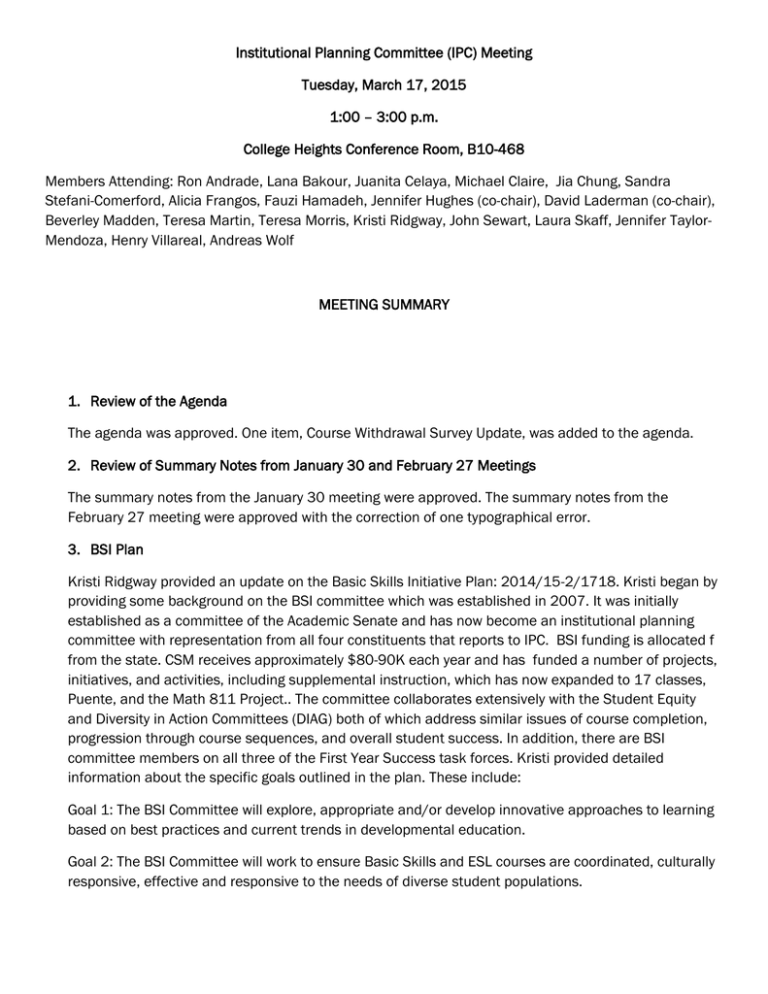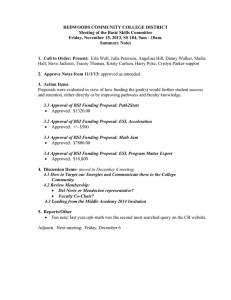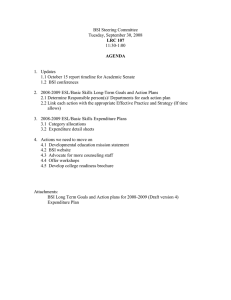Institutional Planning Committee (IPC) Meeting Tuesday, March 17, 2015
advertisement

Institutional Planning Committee (IPC) Meeting Tuesday, March 17, 2015 1:00 – 3:00 p.m. College Heights Conference Room, B10-468 Members Attending: Ron Andrade, Lana Bakour, Juanita Celaya, Michael Claire, Jia Chung, Sandra Stefani-Comerford, Alicia Frangos, Fauzi Hamadeh, Jennifer Hughes (co-chair), David Laderman (co-chair), Beverley Madden, Teresa Martin, Teresa Morris, Kristi Ridgway, John Sewart, Laura Skaff, Jennifer TaylorMendoza, Henry Villareal, Andreas Wolf MEETING SUMMARY 1. Review of the Agenda The agenda was approved. One item, Course Withdrawal Survey Update, was added to the agenda. 2. Review of Summary Notes from January 30 and February 27 Meetings The summary notes from the January 30 meeting were approved. The summary notes from the February 27 meeting were approved with the correction of one typographical error. 3. BSI Plan Kristi Ridgway provided an update on the Basic Skills Initiative Plan: 2014/15-2/1718. Kristi began by providing some background on the BSI committee which was established in 2007. It was initially established as a committee of the Academic Senate and has now become an institutional planning committee with representation from all four constituents that reports to IPC. BSI funding is allocated f from the state. CSM receives approximately $80-90K each year and has funded a number of projects, initiatives, and activities, including supplemental instruction, which has now expanded to 17 classes, Puente, and the Math 811 Project.. The committee collaborates extensively with the Student Equity and Diversity in Action Committees (DIAG) both of which address similar issues of course completion, progression through course sequences, and overall student success. In addition, there are BSI committee members on all three of the First Year Success task forces. Kristi provided detailed information about the specific goals outlined in the plan. These include: Goal 1: The BSI Committee will explore, appropriate and/or develop innovative approaches to learning based on best practices and current trends in developmental education. Goal 2: The BSI Committee will work to ensure Basic Skills and ESL courses are coordinated, culturally responsive, effective and responsive to the needs of diverse student populations. Goal 3: The BSI Committee will actively seek opportunities to partner with groups on and off campus to help fill any gaps in instruction and/or student services to Basic Skills and ESL/academically underprepared students and to be more efficient in our use of resources. Goal 4: The BSI Committee will promote and support organized and professional enrichment opportunities for faculty and staff working with BASIC Skills and ESL students as well as transfer-level faculty who serve large numbers of underprepared students while receiving strong institutional support. Goal 5: The BSI Committee will ensure comprehensive administrative oversight and policies for Basic Skills and ESL allowing students to accomplish their varied educational goals in a reasonable and predictable timeframe. The BSI committee is now working on finalizing the action steps associated with each of the established goals. BSI regularly reports progress on goals and budget expenditures to the State Chancellor’s Office. As an institutional committee, it will provide annual updates to IPC. IPC approved the BSI plan and thanked Kristi and the committee for their excellent work. 4. Printing Class Schedule Jennifer Hughes provided an update on the printing of the class schedule. After further discussion with staff in the Office of Instruction and Community Relations and Marking departments some of the work load issues identified in the Business Process Analysis (BPA) have been resolved. However, because staff from the Community Relations and Marketing Office were not involved in the BPA, which primarily involved deans and division assistants, there are opportunities to further streamline the scheduling process and reduce the extensive amount of time and numerous checks required by many staff. Discussions have also taken place with District ITS to provide a PDF of the class schedule on WebSCHEDULE that can be printed at any time by students, faculty and staff. This schedule will be refreshed daily so as to capture any changes to the class schedule. Eric Raznick is working on two versions of the PDF– one would replicate the information that is in the current class schedule; the other would provide more comprehensive class information, including course description and prerequisite information. Students, faculty and staff could view/print either or both of these documents. As ITS works to develop a more robust mobile app, more students will use these devices to access the schedule. Based on the information gleaned from additional discussions, it was decided that we would continue to print the fall, 2015 class schedule in its current format. This will allow for further discussion with appropriate college personnel and students to take place in the fall semester. A final decision regarding the spring, 2016 class schedule will be made sometime in early fall. We may continue to produce the existing class schedule, if the workload issues for staff can be mitigated, or move to another type of printed Banner report document similar to what will be available on WebSCHEDULE. We want to continue to produce some type of document to “tell the CSM story” to distribute in the community. 5. Course Withdrawal Survey David Laderman reported that the Academic Senate has reviewed and approved the revisions to the survey. The AFT has also approved the survey. Jennifer will talk with John Sewart about activating the survey. Committee members agreed that the survey results are available they should be reviewed by IPC. We should also make sure they are disseminated to the college community and discussed in division meetings and other venues. 6. Strategic Plan Update Rick Voorhees, consultant to the districtwide strategic planning effort, provided an update on the strategic planning process. Rick mentioned that all the information about the planning process, including the draft of the SMCCCCD Strategic Planning Goals, Strategies and Metrics document is now posted to the district website. Rick reviewed the draft document and emphasized that we need to think about where we want the college to be in five years. Committee members then worked in small groups to review and provide initial feedback on the document. As the groups reported out, several suggestions were made, including: Use additional metrics for measuring student success, other than the Scorecard which provides data on a limited number of students Modify some of the wording to ensure that the respective roles of the colleges and district are made clear. Colleges are responsible for developing and implementing strategies to increase student success; the district serves to support those efforts. Some strategies might be able to coordinated districtwide (e.g. Middle College) When referring to the increase in entrepreneurial actions (Goal 4), it is important to ensure that funds generated from these activities will directly support college activities that promote student success. Rick will take the suggestions back to the district steering committee. A feedback form is available on the website should other members of the college community wish to provide feedback. The draft is to be finalized by the end of the spring, 2015 semester and taken to the Board of Trustees for approval in June, 2015. Next Meeting: Friday, April 3, 1:00 – 3:00 p.m. College Heights Conference Room, Bldg. 10-468.

